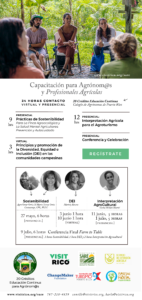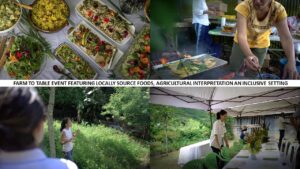Final report for SPDP22-14
Project Information
Puerto Rico could be facing a serious food crisis over the next two decades due to its dependence on imports, worldwide demand for food, and continued decline in local production. The most recent USDA agricultural census shows that the number of farms in Puerto Rico declined from 13,159 in 2012 to 8,230 in 2018 and that farms of less than 10 acres in size experienced a 57% reduction over this period. Most of these smaller farms are owned by individuals or families that make their living from the production of crops sold in the local market. While 80% of small farms are dedicated to crops, 72% of farms over 100 acres in size are dedicated to pasture or grazing. Hence, smaller farms are an extremely important source of locally grown crops and efforts to strengthen their operation and increase their numbers will have a positive effect on Puerto Rico’s food security and economy. The Visit Rico professional development program seeks to increase the number of professionals that can teach and mentor small farmers in low- and moderate-income communities in interpretation and sustainable farming practices to improve farm production and long-term sustainability. Visit Rico’s own experience shows that farmers taking advantage of a growing interest in agritourism, and healthy foods can generate supplemental income and increase sustainability. However, most extension professionals do not have this skill set. The training program will promote diversity, equity, and inclusion (DEI) by teaching agricultural professionals and educators how to integrate these principles into their practice.
The Visit Rico professional development program’s main goal is to enrich the agricultural professional’s toolkit and knowledge base so that they can continue to create impact through their professional practice and strengthen Puerto Rico’s small farmer communities. The program seeks to impact 40 agricultural professionals and educators out of an eligible population above 400 in a one year span and has three training objectives: 1) providing courses and experiences that lead to competency development and mastery in agricultural interpretation and interpretation training, 2) Increasing or updating knowledge in organic and sustainable agricultural production and ability to transfer knowledge, 3) and educating about the importance of DEI in the agriculture profession and in promoting DEI through their professional practice to impact agricultural communities positively. The program’s target audience are Extension Service agents, USDA field personnel, agricultural professionals and educators, and mentor farmers across Puerto Rico.
Cooperators
- - Technical Advisor
- - Technical Advisor
Education
The evaluation used pre- and post-tests to measure knowledge gains and end-of-session questionnaires for participant satisfaction. Tests were administered online, comparing mean scores to assess learning outcomes.
Education & Outreach Initiatives
The Visit Rico professional development program’s main goal is to enrich the agricultural professional’s toolkit and knowledge base so that they can continue to create impact through their professional practice and strengthen Puerto Rico’s small farmer communities. The program seeks to impact 40 agricultural professionals and educators out of an eligible population above 400 in a one year span and has three training objectives: 1) providing courses and experiences that lead to competency development and mastery in agricultural interpretation and interpretation training, 2) Increasing or updating knowledge in organic and sustainable agricultural production and ability to transfer knowledge, 3) and educating about the importance of DEI in the agriculture profession and in promoting DEI through their professional practice to impact agricultural communities positively. The program’s target audience are Extension Service agents, USDA field personnel, agricultural professionals and educators, and mentor farmers across Puerto Rico.
Activities included training sessions on sustainable agriculture, agricultural interpretation, farmer’s mental health, and DEI. Participation varied per session, with up to 39 participants completing evaluations.
The evaluation used pre- and post-tests to measure knowledge gains and end-of-session questionnaires for participant satisfaction. Tests were administered online, comparing mean scores to assess learning outcomes.
The largest knowledge gain was observed in agricultural interpretation, with 89% of participants showing improvement. DEI workshops had the highest post-test scores, indicating strong prior knowledge in these areas. Participants expressed intentions to apply what they learned, with more than 80% indicating high likelihood across all topics.
Educational & Outreach Activities
Participation summary:
Learning Outcomes
Project Outcomes
As proposed in the evaluation plan, the purpose of this program evaluation was to measure knowledge and skills gained by the participants in the professional development program. The evaluation design followed the pre/post-test approach. The pre-test was administered before the training session to determine the participants’ knowledge in the topics. The post-test included the same questions and was administered at the end to determine if participants increased their knowledge after the training sessions. The tests consisted of 10 to 21 questions on the basic concepts and learning objectives presented in each training session. Questions were close-type questions including multiple choice and true/false questions. Pre/posts tests were administered in each training session: Sustainable Agriculture, Agricultural Interpretation, Farmer’s Mental Health and Diversity, Equity and Inclusion (where three evaluations were conducted for each topic presented). Both tests were online questionnaires. Data was analyzed by comparing mean scores between the pre and post-tests. In addition, a comparison between the pre/posts tests on each question was performed. This would help in identified which specific topics will need reinforcement in future programs.
As part of the evaluation, end-of-session questionnaires were also administered to measure participants ’satisfaction with the program. Participants were asked about different aspects of the workshops and presenters. An open-ended question was included to collect opinions and recommendations from participants for future programs. As with the pre/post-tests, these questionnaires were administered after each training session. A final evaluation was also sent to participants, at the end of the training program, to collect additional information and opinions on the educational experience in general. All questionnaires were administered online.
Results of knowledge gained by participants, measured by the pre/post-tests, are presented on the following table for each of the training sessions.
| Training Session Topics | Pre-test (Mean score) |
Post-test (Mean score) |
Mean Difference |
| Sustainable Agriculture (N=39) | 77 | 82 | 5 |
| Agricultural Interpretation (N=38) | 40 | 64 | 24 |
| Farmer’s Mental Health (N=38) | 75 | 77 | 2 |
| Diversity, Equity and Inclusion-I (N=24) | 82 | 92 | 10 |
| Diversity, Equity and Inclusion-II (N=27) | 83 | 91 | 8 |
| Diversity, Equity and Inclusion-III (N=33) | 94 | 97 | 3 |
N= number of participants that completed the tests
These data shows that the highest scores on the post-test were obtained in the DEI workshops, however, it is also observed that the pre-tests have a higher mean score which suggests that the participants had a previous knowledge on these topics. The lowest mean score in the post-test was obtained for the Agricultural Interpretation topic, however, when comparing the pre and post-test scores it shows the largest mean difference which suggest that the largest change in knowledge was obtained for this topic.
An additional analysis conducted by individuals showed that the Agricultural Interpretation topic had the highest percent of participants, 89%, that increased their knowledge’s scores from the pre-test to the post-test. The following table presents the percent of participants that increased their knowledge’s scores.
| Training Session Topics | Percent of Participants that Increased Knowledge Score |
| Sustainable Agriculture | 56 |
| Agriculture Interpretation | 89 |
| Farmer’s Mental Health | 37 |
| Diversity Equity Inclusion (I) | 71 |
| Diversity Equity Inclusion (II) | 44 |
| Diversity Equity Inclusion (III) | 27 |
These data indicates that participants in the training program obtained new knowledge in each of the topic’s session presented, been the Agricultural Interpretation topic the one with the largest change in knowledge, according to the data presented in the previous tables.
It is expected, after concluding the professional development program, that the participants will put in practice what they have learned. In the final session questionnaire participants were asked if they will put in practice their knowledge gained. Eighty percent and more of the participants in all training sessions said that it was highly probable that they will. The following table presents these data.
| Training Session Topics | Percent of Participants that Will Put in Practice Knowledge Gained |
| Sustainable Agriculture (N=28) | 93 |
| Agricultural Interpretation-I (N=32) | 97 |
| Agricultural Interpretation-II (N=27) | 100 |
| Farmer’s Mental Health (N=25) | 80 |
| Diversity, Equity and Inclusion-I (N=37) | 89 |
| Diversity, Equity and Inclusion-II (N=11) | 100 |
N= number of participants that completed the tests
Other findings showed that more than 90% of participants agree or totally agree that the educational material presented was pertinent and informative, and that the information presented was updated. The participants responses to what was the most valuable aspect of the educational program were categorized as followed: dynamic and well-prepared presenters; pertinent and valuable topics, particularly the Agricultural Interpretation topics, and the opportunity to meet and share experiences with other persons. As for topics of interest for future programs, participants mentioned a variety of topics including administration of an agro-business; insurance, economic incentives and permits for these types of businesses; budget for an agro-touristic project; expand topics in Agricultural Interpretation, among others. Findings from the evaluation demonstrated that participants gained new knowledge in each of the topics presented in the professional development training program and that they will highly probably put in practice this knowledge. Participants were satisfied with the quality of the educational materials and sessions presented and expect that the program can be expanded with future topics of interest.

